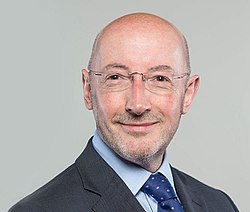Career
In January 2009,Harra became Director of Corporation Tax and VAT,and then Director of Personal Tax Customer Operations in March 2011,and Director Personal Tax Operations in October 2011. He was Director-General for Business Tax from 2012 to 2016,when he succeeded Edward Troup as Tax Assurance Commissioner. [4] [5] He became Tax Assurance Commissioner and Director General Customer Strategy and Design in October 2016 and was appointed Second Permanent Secretary at HMRC in November 2017. [6] He is also a member of the Board of the department. [7]
In November 2017,Harra appeared on BBC's Panorama programme about VAT fraud. [8]
Harra was also HMRC's LGB&T Champion. [9]
In October 2024 it was announced that Harra would retire from HMRC in April 2025. [10] He was replaced by John-Paul Marks. [11]
This page is based on this
Wikipedia article Text is available under the
CC BY-SA 4.0 license; additional terms may apply.
Images, videos and audio are available under their respective licenses.
